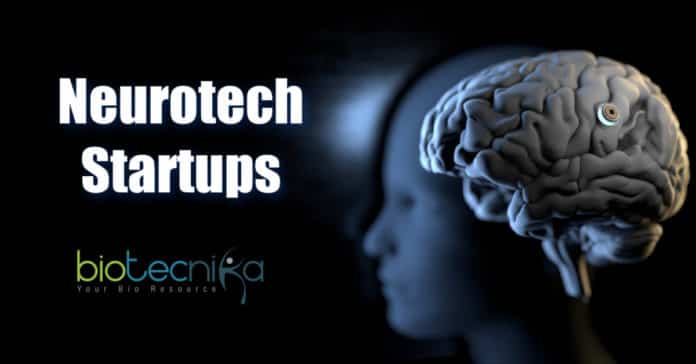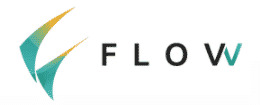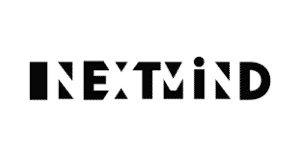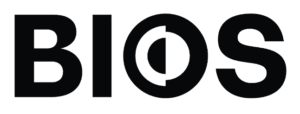Booming Startups Of Neurotechnology
Neurotechnology is the collaboration between the human brain and technology, which has a key influence on how people understand the brain and various aspects of consciousness, thought, and higher-order activities in the brain. Additionally, it involves technologies that are intended to improve and repair brain function and allow scientists and clinicians to visualize the brain. This market rate of this technology has risen in the past 2 decades. Currently, Neurotechnology is having a considerable influence on humans by enhancing people’s brain health and cognitive capabilities.
As the domain of digital healthcare is growing from basic monitoring applications to highly regulated medical devices, there are cutting side technologies being established that are fading away the gap between biology and computers.
The Booming Startups Of Neurotechnology involves brain-machine interfaces, neuroprosthetics, neurostimulation, neuromonitoring, and implantable tools. It also includes technologies that are intended to improve and repair brain function and allow scientists and doctors to visualize the brain and understand it in a better way.
Now let’s see a few of Neurotech Startups which is going to be masters of the future.
- Neuralink
Headquarters San Francisco, California, United States Founded 2016 Founder Elon Musk Number of employees 51-100 Investors Elon Musk Total Disclosed Funding $27M Website www.neuralink.com Neuralink is working on brain implants to directly connect human minds to computers. It is assumed that the firm’s objective is to manufacture AI as an extension of the human brain, typically developing a symbiotic human-AI connection.
Image credits: https://neuralink.com/approach/ The company has a group of highly skilled people. They are building the future of brain interfaces: building tools that will assist individuals with paralysis and inventing new innovations that will increase their abilities, their area, and the world.
- Kernel
| Headquarters | Los Angeles, California, U.S. |
| Founded | 2016 |
| Founder | Bryan Johnson |
| Number of employees | 51-100 |
| Investors | Bryan Johnson |
| Total Disclosed Funding | $100M |
| Website | https://kernel.co/ |
Kernel is an early-stage brain-machine interface neuroscience firm that specializes in developing brain-recording modern technologies. It is a human intelligence firm creating neuroprosthesis to mimic, repair, and improve cognition. Kernel’s Neuroscience as a Service (NaaS) provides on-demand access to its brain recording technology. They develop the interfaces and insights required to unlock the unknown part of science: the inner workings of the human brain and mind.

The company is currently working on a way and stimulate the electrical impulses of many neurons simultaneously. This innovation can be used clinically for conditions like depression or Alzheimer’s.
3. Thync
| Headquarters | Los Gatos, California, United States |
| Founded | 2011 |
| Founder | Isy Goldwasser and Kane Russell |
| Number of employees | 11-50 |
| Investors | Khosla Ventures, Andreessen Horowitz, Noosphere Ventures |
| Total Disclosed Funding | $13M |
| Website | www.thync.com |
Thync was established as a result of out of a fascination with how neuroscience can affect life by professionals in the discipline of neurobiology.
The company has developed a small, wearable “pod” that attaches to the back of the neck and applies neurostimulation to fight stress and enhance better sleep. Their top product, the Thync Relax Pro, utilizes low levels of electrical stimulation to activate nerve pathways in the head and neck. As per the firm, these pathways interact with regions of the brain to better regulate stress levels and sleep quality.
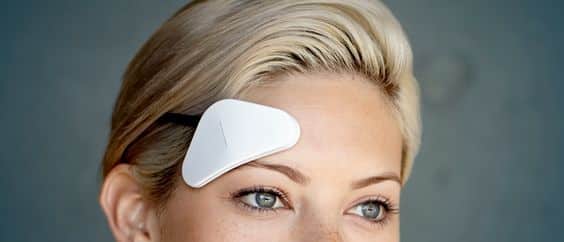
The company is engineering a lifestyle wearable gadget that makes use of neuro signaling algorithms – waveforms that signal neural pathways – to shift and optimize an individual’s state of mind in regions related to energy, calmness, and focus.
4. Dreem
| Headquarters | San Francisco, California, United States |
| Founded | 2014 |
| Founder | Hugo Mercier and Quentin Soulet de Brugiere |
| Number of employees | 51-100 |
| Investors | Innovation Commission 2030, Johnson & Johnson, Laurent Alexandre, MAIF Avenir, Xavier Niel |
| Total Disclosed Funding | $57.5M |
| Website | dreem.com |
Dreem is a booming startup of neurotechnology, formerly known as Rythm.
Every person is fretted about their sleep and rest, and this leading neurotech startup is working with the concern. Dreem has developed a head-mounted wearable to monitor sleep. The device uses EEG electrodes to monitor and analyze brain activity during the course of sleep. It then uses “bone conduction technology” to modulate brain activity by emitting subtle sounds at precise moments that the company claims enhances the overall quality of deep sleep.

The gadget is linked to an application that displays sleep metrics and personalized recommendations based on the individual’s sleep practices. It utilizes bone transmission technology to modulate brain activity by emitting exquisite audios at specific times that the company asserts to boost the total quality of deep sleep.
5. Synchron
| Headquarters | Campbell, California, United States |
| Founded | 2013 |
| Founder | Thomas Oxley, Rahul Sharma, and Nicholas Opie |
| Number of employees | 1-10 |
| Investors | DARPA, U.S. Department of Defense, Neuro Technology Investors |
| Total Disclosed Funding | $10M |
| Website | www.synchronmed.com |
Synchron is a firm committed to the advancement of minimally invasive neural user interface technologies. It is a clinical-stage neurovascular bioelectronics medicine company developing bloodstream-enabled remedies for previously-untreatable diseases related to nerves.
The company is currently developing an implantable gadget – Stentrode, that targets to provide a safe way for paralyzed individuals to attain direct brain control of mobility-assistive gadgets. They are planning for early-phase clinical trials to assess the safety and feasibility of the gadget to allow patient-directed brain control.
6. Halo Neuroscience
| Headquarters | San Francisco, California, United States |
| Founded | 2013 |
| Founder | Dr. Brett Wingeier |
| Number of employees | 11-50 |
| Investors | Andreessen Horowitz, Lux Capital, Jazz Venture Partners, Xfund |
| Total Disclosed Funding | $24.7M |
| Website | haloneuro.com/ |
Halo Neuroscience is a neurotech firm concentrating on utilizing electrical neurostimulation to treat human diseases and unlock human performance.

This booming startups of neurotechnology have created a brain-stimulating gadget known as Halo Sport, which sends out weak electrical pulses into the individual’s brain with the intention to enhance the effectiveness of physical training. The device is based on the principle of neuropriming – using electric stimulation to raise plasticity in the brain before an activity.
7. Neurable
| Headquarters | Cambridge, Massachusetts, United States |
| Founded | 2016 |
| Founder | Ramses Alcaide and Adam Molnar |
| Number of employees | 1-10 |
| Investors | Mithril Capital Management, Loup Ventures, NXT Ventures, BOSS Syndicate |
| Total Disclosed Funding | $7.2M |
| Website | neurable.com |
Neurable develops brain-enabled control for virtual and augmented reality. Neurable is establishing brain-computer interfaces that enable individuals to control software and gadgets utilizing their brain activity. The software uses artificial intelligence techniques to minimize the lag time between analysis of neural activity and the result, potentially lowering it down to real-time. The company’s current headset utilizes 6 dry electrodes and takes 2 minutes to calibrate, a remarkable enhancement on its earlier model which relied on 32 wet electrodes to control brain activity and a calibration process of half an hour.
Neurable ultimately aims to allow people who are unable to communicate to have greater control over their surrounding, it is originally targeting the AR/VR gaming sector.
8. Flow Neuroscience
| Headquarters | Malmö, Skane Lan, Sweden |
| Founded | 2016 |
| Founder | Erik Rehn and Daniel Månsson |
| Number of employees | 1-10 |
| Investors | Khosla Ventures, SOSV, HAX |
| Total Disclosed Funding | $1.2M |
| Website | flowneuroscience.com/wp |
Flow Neuroscience uses brain stimulation to treat depression, they have developed a headset that provides transcranial direct current stimulation (tDCS) to the forehead. This tDCS inverts neural activity imbalances in the frontal lobe observed in individuals with clinical depression. The gadget can be paired with your mobile phones, which will guide the customer through a 6-week wellness program.

If the FDA approves this device, it will be the very first DCS product for treating depression without a prescription or the supervision of a medical expert. They believe that unlocking the science of the brain is vital to understand mental concerns. Their vision is to make everybody feel better and live healthily. They intend to make depression treatment simplistic and available to everybody.
9. Cognixion
| Headquarters | Santa Barbara, California, United States |
| Founded | 2014 |
| Founder | Andreas Forsland |
| Number of employees | 11-50 |
| Investors | Tom Washing |
| Total Disclosed Funding | $2.35M |
| Website | www.cognixion.com |
Cognixion is one of the booming startups of neurotechnology which intends to develop products that promote interaction for people with speech pathologies and other communication challenges. The product is based on AI and augmented reality. Their first software product, a mobile application – Speakprose, is now available for iPhones.
They aim to unlock speech for millions of people around the world having communication difficulties.

Cognixion is a neurotech Artificial Intelligence firm developing a commercially feasible biosignal recognition system that moves neuroscience from the laboratory to the market. Cognixion is globally recognized for its innovation and use of exponential technologies to solve a social and healthcare global challenge – concerning the lives of 509 million individuals not able to speak.
10. BrainCo, Inc.
| Headquarters | Somerville, Massachusetts, United States |
| Founded | 2015 |
| Founder | Bicheng Han |
| Number of employees | 11-50 |
| Investors | Boston Angel Club, Hantan Capital, Wandai Capital |
| Total Disclosed Funding | $5.6M |
| Website | www.brainco.tech |
BrainCo endeavors to use a brain-machine interface (BMI) and neurofeedback training to optimize the potential of the human brain. BrainCo was established from the Harvard Innovation Lab. They develop cognitive training technology products and utilize their experience in machine learning, design, and neuroscience to develop innovative cognitive-based purposes.
BrainCo’s main product is the focus series involving wearable headbands for education, fitness, and mind-controlled games. They have also extended their products into prosthetics, working under the name BrainRobotics. They are developing a robotic prosthetic hand that can be regulated by the user’s mind. Utilizing machine learning and electromyography, which measures brain signals to different muscle groups, BrainRobotics’ prosthesis product is now capable of reproducing 6 different tactile hand movements.
11. Paradromics
| Headquarters | Austin, Texas, United States |
| Founded | 2015 |
| Founder | Matt Angle |
| Number of employees | 11-50 |
| Investors | Fusion Fund, Arkitekt Ventures, Loup Ventures |
| Total Disclosed Funding | $27.4M |
| Website | paradromics.com |
Paradromics focuses on neurological brain-machine interfaces technology meant to enhance the data transmission rate between brains and devices.
They develop neuroprostheses made to assist patients with specials needs, like blindness, to better navigate and communicate with the people around. Paradromics is a group of professionals and technical visionaries committed to the goal of resolving important health concerns as solvable technical problems using BCI innovation.

Paradromics is establishing high-volume bidirectional data streaming abilities between brains and computers. Their neural interface technologies will be first utilized to assist disabled individuals to reconnect with the outdoors.
12. NextMind
| Headquarters | Paris, Ile-de-France, France |
| Founded | 2017 |
| Founder | Sid Kouider, David Helgason, and Sune Alstrup Johansen |
| Number of employees | 11-50 |
| Investors | David Helgason, BPI France |
| Total Disclosed Funding | $4.6M |
| Website | www.next-mind.com |
NextMind is another booming startup of neurotechnology which develops brain-machine interface technology, and it has developed a little, head-mounted sensing unit that is aimed targeted to enable individuals to send commands to exterior peripherals with their thoughts. They are a fast-growing group of neuroscientists, artificial intelligence as well as hardware engineers, and designers developing a telepathic connection between humans and technology.

NextMind develops wearable non-invasive EEG technology, worn on the back of your head over the visual cortex area. They have a gadget that enables commands to be input into computers and AR/VR headsets utilizing visual attention. They intend to develop innovations to enable external tools to be regulated with visual imagination also.
13. BIOS
| Headquarters | Cambridge, Cambridgeshire, United Kingdom |
| Founded | |
| Founders | Emil Hewage and Oliver Armitage |
| Number of employees | 11-50 |
| Investors | Endure Capital, K5 Ventures, Heuristic Capital Partners |
| Total Disclosed Funding | $4.8M |
| Website | www.bios.health |
BIOS (previously known as Cambridge Bio-Augmentation Systems)is a full-stack neural interface platform, that utilizes AI to decode and encode the signals from the body, to treat severe health problems.
Currently, they are building a “USB connector for the body,” – a prosthetic interface gadget, which is designed to permit amputees to regulate prostheses with brain signals. They are unlocking the capacity of the nervous system in treating chronic conditions with the help of AI-powered neural interfaces.
14. MindMaze
| Headquarters | Lausanne, Vaud, Switzerland |
| Founded | 2012 |
| Founders | Tej Tadi |
| Number of employees | 51-200 |
| Investors | Leonardo DiCaprio |
| Total Disclosed Funding | $118.5M |
| Website | www.mindmaze.com |
MindMaze develops an instinctive mind/machine interface through its neuro-inspired computing system. MindMaze utilizes gamification to aid with neurorehabilitation. The firm’s MindMotion product is developed to be utilized in clinical settings after a person suffers a neurological injury, like stroke. The product provides task-based virtual environments with the purpose of supporting patients to exercise motor movements.

The company is pioneering an advanced computer platform that records brain activity upon intent, producing a new os for computers – a brain O/S. Based upon years of meticulous testing in the medical care sector, MindMaze has developed an intuitive mind/machine interface, which makes use of pre-realtime decoding of mind signals via neural prediction.
15. Q30 Innovations
| Headquarters | Westport, Connecticut, United States |
| Founded | 2013 |
| Founders | Bruce Angus and Thomas Hoey |
| Number of employees | 1-50 |
| Investors | N/A |
| Total Disclosed Funding | $4.85M |
| Website | q30innovations.com |
Q30 Innovations is a neurosciences company whose goal is to preserve brain health on the sports field as well as the battlefield. They are establishing a technology that claims to minimize traumatic brain injury. Their major product is a Q-Collar – a wearable tool created to cushion the brain by boosting blood circulation, this product is mainly targeted for sportsmen and army employees.
Likewise, Q30 Innovations is partnering with both the U.S. and Canadian Armed forces to perform research with special operations soldiers.
Keyword: Booming Startups Of Neurotechnology


